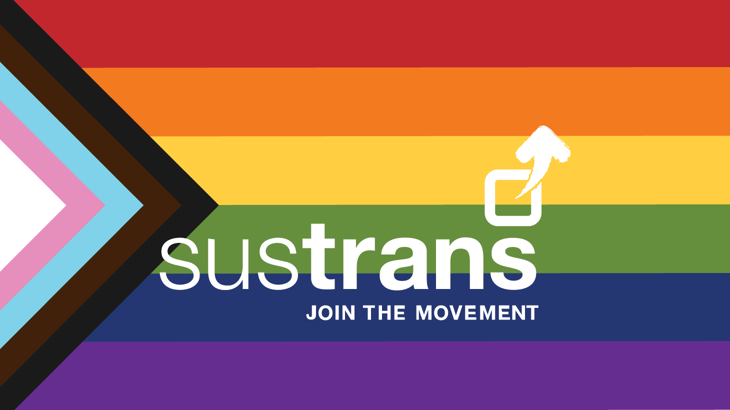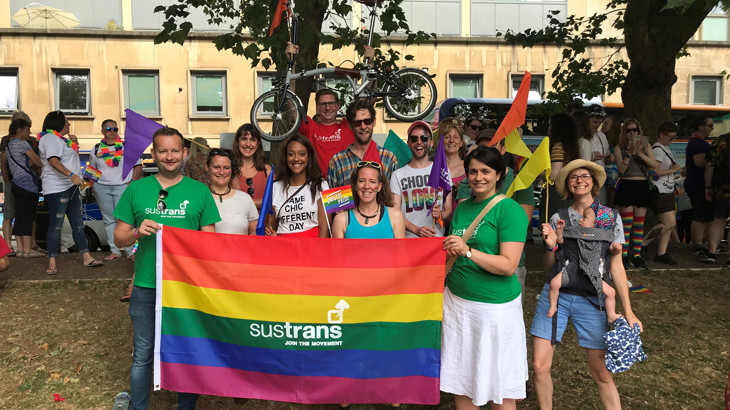Being a charity for everyone is a key pillar of who we are at Sustrans. And including everyone in the work we do is one of our organisational values. But what does that actually mean in practice? Katie and Graham, two members of our LGBTQQIA+ staff network, share their stories and look at how being a charity for everyone affects the ways we work, our projects and our services.

Attending Pride marches, changing our profile picture across our social media accounts, and telling these stories on our website, are some of the small but not insignificant ways we can support those who identify as LGBTQQIA+.
Starting my journey with Sustrans
Graham: “I was nervous to start work at Sustrans for many reasons. One of them was whether I’d be accepted for not being ‘a cyclist’.
“Another was because we were all encouraged to fill in an anonymous form stating some of our characteristics, including our sexuality.
“I spent minutes that felt like years staring at that form, too nervous to press ‘submit’. It felt too real, too official, and too concrete.
“Both of these things scared me because I felt like I might not be accepted. Or worse, in the case of my sexuality, rejected or attacked.
“I’m sure it’s a familiar feeling to most people. But it’s definitely highly common amongst lesbian, gay, bisexual, trans, queer, questioning, intersex and asexual (LGBTQQIA+) people.
“As well as people of colour, disabled people and people at the intersection of multiple identities."
Using my privilege for good
Graham: “Yet I’m a cis-gender able-bodied middle-class white man. I have many privileges that others don’t have.
“I’d spent so many years trying to blend in, to hide away and to not speak up.
“But after I’d pressed submit on that form, a step on the path to accepting myself, I decided I wasn’t going to turn back and I wasn’t going to be so quiet anymore. I could use my privilege."
Feeling like I can be myself at work
Graham: “I’ve now gone from being closeted and afraid to accepting myself.
“And I’ve helped to set up a UK-wide employee network of LGBTQQIA+ colleagues.
“My story of accepting myself is separate from but entwined with Sustrans.
“The people I’ve worked with have helped me to feel welcome and that I can be myself. I went to my first Pride parade with Sustrans colleagues.”
I knew I was different
Katie: “I grew up in a village, school and community where being gay wasn't a thing.
“Not only did I never meet an openly gay person, but it also wasn't discussed or acknowledged, only the occasional bullying playground taunts.
“Even the mainstream TV shied away, with little reference.
“I knew I was different. I knew I didn't quite fit in but I didn't know why.
“It is a difficult journey growing up into adulthood.
“Slowly aware of who you are and then fearing that the world is in no way going to accept you, in fact, it might well reject you."
Everyone’s journey is personal and unique
Katie: “This journey through some of the most important developmental stages of my life has, of course, long-lasting consequences.
“All LGBTQQIA+ people have their coming out stories and each is personal, unique and rarely straightforward.
“I started working for Sustrans in 2005 (when I was 25), and I can honestly say that this was the first time I began to really feel accepted and okay with who I was.
“It is here that I have built some of the strongest friendships of my life. It has provided me with an environment where I have felt welcome and safe."
Supporting Sustrans to be inclusive and diverse
Katie: “So why set up an LGBTQQIA+ network?
“Having never previously been part of an LGBTQQIA+ anything, this was a big step for me. But I wanted to go outside of my comfort zone because that’s how we learn.
“I wanted to challenge myself, to open my eyes more and learn more about my LGBTQQIA+ colleagues’ experiences.
“I want to make sure that Sustrans is not only a welcoming, inclusive and diverse place to work, but that this extends to the communities, groups and individuals who are involved across our work.
“With the Progress Pride Network now in place, I already feel a greater sense of belonging. The power of community is huge.”
The facts
Stonewall says that over 100 hate crimes are committed against LGBTQQIA+ people each week. And same-sex relationships are still illegal in over 70 countries.
There has been clear progress in some areas but it’s not enough.
More than 40% of trans people in Britain have been attacked or threatened with violence.
Over 75,000 young LGBTQQIA+ people are bullied each year at school in the UK.
According to the BBC and the European Union Federation for Fundamental Rights in 2019, 21% of all LGBTQ Europeans reported experiencing workplace discrimination.
Among transgender people specifically, that rate jumped to 36%.
Many of us, if not all of us in the LGBTQQIA+ community, have suffered abuse, violence, discrimination and/or been ostracised because of who we are, who we love, the way we behave or the way we are perceived.
Sustrans is a charity for everyone
Being for everyone is a key pillar of who we are at Sustrans. And 'including everyone’ is one of our organisational values.
But what does that actually mean in practice? How does that affect the ways we work, our projects and our services?
How does that affect our staff, our volunteers and our supporters? How does it affect communities we work with, partners we work with, and the data we collect?

Our Progress Pride group is a community of people standing up together against discrimination and to progress towards acceptance and equality for everyone.
That’s where the Progress Pride Network comes in
We’ve set up a network of Sustrans staff to try to answer some of these questions and take action from an LGBTQQIA+ community perspective.
Nearly 50 colleagues are members of the Progress Pride Network here at Sustrans.
We work together to raise awareness of issues affecting the community, run social and knowledge-sharing events, and influence organisational policy.
We're called the Progress Pride Network because the inclusive Pride flag is named the Progress Pride flag.
This is a souped-up rainbow flag that ensures trans and non-binary people and people of colour are reflected and included, something we strive for. We are here to create momentum and progress pride.
Attending Pride marches, changing our profile picture across our social media accounts, and telling these stories on our website, are some of the small but not insignificant ways we can support those who identify as LGBTQQIA+.
But they are only meaningful if we are committed to making changes across our policies, practices and culture.
With the Progress Pride Network in place and being supported by all parts of the charity, Sustrans is proactively doing more than just talking the talk.
As a network, we’re here to support each other.
We’re a community of people standing up together against discrimination and to progress towards acceptance and equality for everyone.
Watch our Progress Pride Network, along with other volunteers, transforming mileposts on the National Cycle Network:





